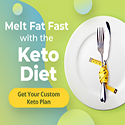The Ultimate Keto Diet Guide
The Ketogenic Diet, commonly known as the Keto Diet, has gained significant popularity in recent years for its potential health benefits, including weight loss. This low-carbohydrate, high-fat diet plan has been embraced by many individuals seeking a new approach to improve their overall well-being. In this Keto Diet Guide, we will delve into the essential aspects of the Keto Diet, including what it entails, its benefits, as well as considerations to keep in mind before embarking on this regimen.
What Is the Keto Diet?
The Keto Diet is a high-fat, low-carbohydrate eating plan designed to transition the body into a state of ketosis. Ketosis is a metabolic process where the body primarily uses fats for fuel instead of carbohydrates. By drastically reducing carbohydrate intake and increasing fat consumption, the body shifts to burning stored fat for energy, which can lead to weight loss and other potential health benefits.
What Foods Can You Eat on the Keto Diet Plan?
On the Keto Diet, individuals focus on consuming foods rich in healthy fats, such as avocados, nuts, seeds, and oils, while limiting their intake of carbohydrates from sources like bread, pasta, and sugary treats. Proteins from sources like meat, fish, and eggs are also included in moderate amounts to support overall health and muscle maintenance. By following a strict macronutrient ratio that typically consists of 70-75% fat, 20-25% protein, and 5-10% carbohydrates, individuals can effectively maintain ketosis and reap the benefits of the diet plan.
What Are the Potential Benefits of the Keto Diet?
The Keto Diet has been associated with a range of potential health benefits beyond weight loss. Some studies suggest that following a ketogenic eating pattern may improve blood sugar control and insulin sensitivity, which can be beneficial for individuals with diabetes or those at risk of developing the condition. Additionally, the Keto Diet has been linked to increased levels of HDL cholesterol (the “good” cholesterol) and decreased levels of triglycerides, potentially reducing the risk of heart disease.
Can the Keto Diet Guide Help with Weight Loss?
Weight loss is one of the primary reasons individuals choose to adopt the Keto Diet. By restricting carbohydrates and increasing fat intake, the body enters a state of ketosis, where it burns stored fat for fuel. This process can lead to significant weight loss, particularly in the form of body fat, while helping individuals maintain muscle mass. However, it’s essential to combine the Keto Diet with a balanced lifestyle that includes regular physical activity for optimal results.
What Are the Downsides of the Keto Diet Guide?
While the Keto Diet Guide offers many potential benefits, it’s essential to consider the downsides before committing to this eating plan. Some individuals may experience initial side effects known as the “keto flu,” which can include fatigue, headaches, and dizziness as the body adjusts to burning fat for fuel. Additionally, the restrictive nature of the Keto Diet may make it challenging for some individuals to adhere to in the long term, leading to potential nutrient deficiencies if not properly managed.
Who Shouldn’t Do the Keto Diet Plan?
While the Keto Diet can be beneficial for many individuals, it may not be suitable for everyone. Individuals with certain medical conditions, such as pancreatitis or liver disease, should consult with a healthcare provider before starting the Keto Diet. Pregnant or breastfeeding women, as well as individuals with a history of eating disorders, should also approach this diet plan with caution and seek guidance from a healthcare professional to ensure their nutritional needs are met.
The Bottom Line
In conclusion, the is a popular eating plan that has gained recognition for its potential health benefits, including weight loss and improved metabolic markers. By emphasizing healthy fats, moderate protein intake, and limited carbohydrates, individuals can effectively transition their bodies into a state of ketosis and achieve their health goals. However, it’s crucial to consider the potential downsides of the Keto Diet and consult with a healthcare provider before making any significant dietary changes. With proper guidance and a balanced approach, the Keto Diet can be a valuable tool for individuals looking to improve their overall well-being.








